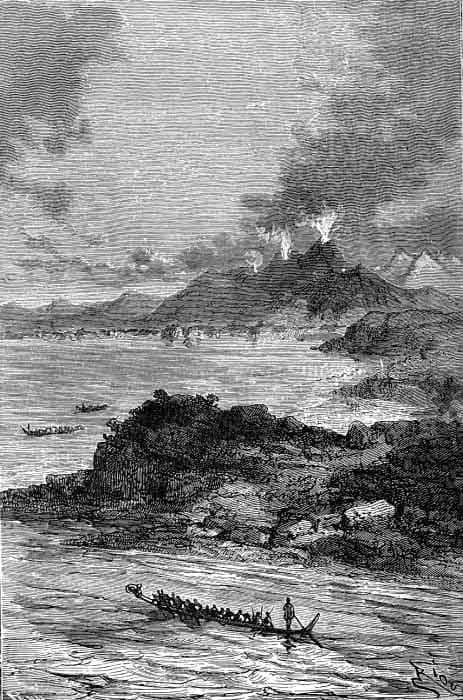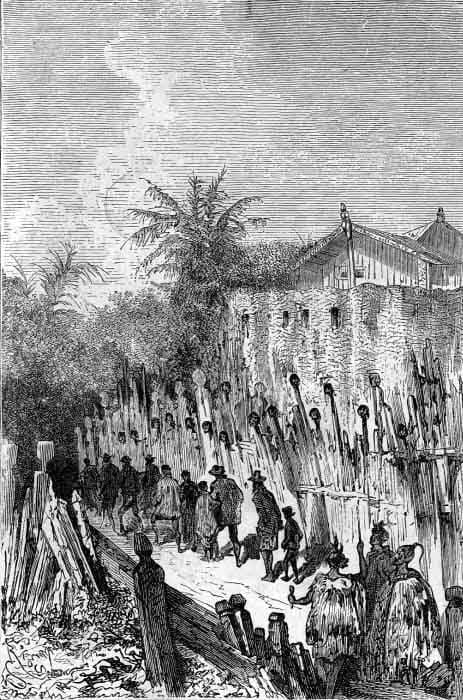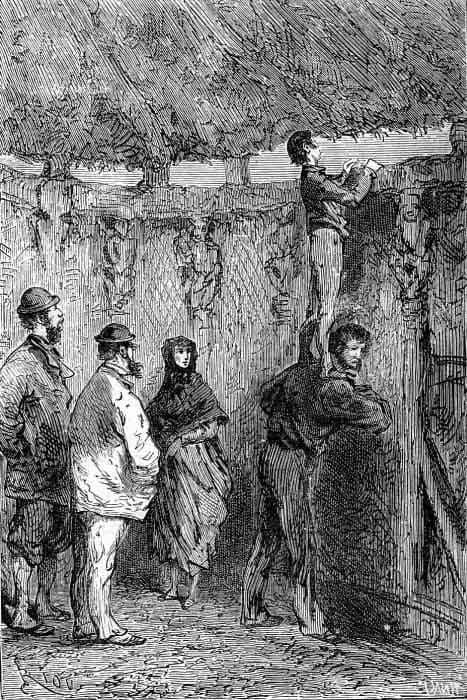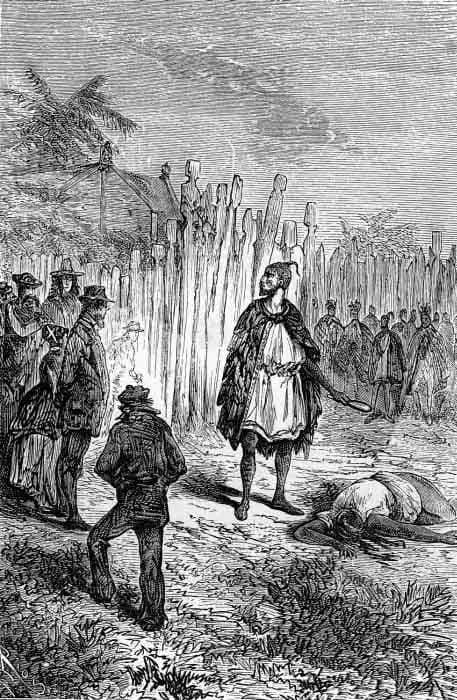CHAPTER XLIX.
A MOMENTOUS INTERVIEW.
Long before historic times, an abyss, twenty-five miles long and twenty wide, must at some period have been formed by a subsidence of subterranean caverns in the volcanic district forming the centre of the island. The waters of the surrounding country have rushed down and filled this enormous cavity, and the abyss has become a lake, whose depth no one has yet been able to measure.
Such is this strange Lake Taupo, elevated eleven hundred and fifty feet above the level of the sea, and surrounded by lofty mountains. On the west of the prisoners towered precipitous rocks of imposing form; on the north rose several distant ridges, crowned with small forests; on the east spread a broad plain furrowed by a trail and covered with pumice-stones that glittered beneath a net-work of bushes; and on the north, behind a stretch of woodland, volcanic peaks majestically encircled this vast extent of water, the fury of whose tempests equaled that of the ocean cyclones.
But Paganel was scarcely disposed to enlarge his account of these wonders, nor were his friends in a mood to listen. They gazed in silence towards the northeast shore of the lake, whither the canoe was bringing them.
The mission established at Pukawa, on the western shores, no longer existed. The missionary had been driven by the war far from the principal dwellings of the insurrectionists. The prisoners were helpless, abandoned to the mercy of the vengeful Maoris, and in that wild part of the island to which Christianity has never penetrated. Kai-Koumou, leaving the waters of the Waikato, passed through the little creek which served as an outlet to the river, doubled a sharp promontory, and landed on the eastern border of the lake, at the base of the first slopes of Mount Manga.
A quarter of a mile distant, on a buttress of the mountain, appeared a “pah,” a Maori fortification, situated in an impregnable position. The prisoners were taken ashore, with their hands and feet free, and conducted thither by the warriors. After quite a long détour, Glenarvan and his companions reached the pah.


This fortress was defended by an outer rampart of strong palisades, fifteen feet high. A second line of stakes, and then a fence of osiers, pierced with loop-holes, inclosed the inner space, the court-yard of the pah, in which stood several Maori tents, and forty huts which were symmetrically arranged.
On their arrival, the captives were terribly impressed at sight of the heads that ornamented the stakes of the second inclosure. Lady Helena and Mary Grant turned away their eyes with more of disgust than terror. These heads had most of them belonged to hostile chiefs, fallen in battle, whose bodies had served as food for the conquerors. The geographer knew them to be such by their hollow and eyeless sockets!
In Kai-Koumou’s pah only the heads of his enemies formed this frightful museum; and here, doubtless, more than one English skull had served to increase the size of the chief’s collection.
His hut, among those belonging to warriors of lower rank, stood at the rear of the pah, in front of a large open terrace. This structure was built of stakes, interlaced with branches, and lined inside with flax matting.
Only one opening gave access to the dwelling. A thick curtain, made of a vegetable tissue, served as a door. The roof projected so as to form a water-shed. Several faces, carved at the ends of the rafters, adorned the hut, and the curtain was covered with various imitations of foliage, symbolical figures, monsters, and graceful sculpturing, a curious piece of work, fashioned by the scissors of the native decorators.
Inside of the habitation the floor was made of hard-trodden earth, and raised six inches above the ground. Several rush screens and some mattresses, covered with woven matting of long leaves and twigs, served as beds. In the middle of the room a hole in a stone formed the fireplace, and another in the roof answered for a chimney.
The smoke, when it became sufficiently thick, perforce escaped at this outlet, but it of course blackened the walls of the house.
On one side of the hut were storehouses, containing the chief’s provisions, his harvest of flax, potatoes, and edible ferns, and the ovens where the various articles of food were cooked by contact with heated stones. Farther off, in small pens, pigs and goats were confined, and dogs ran about seeking their scanty sustenance. They were rather poorly kept, for animals that formed the Maori daily food.
Glenarvan and his companions had taken in the whole at a glance. They awaited beside an empty hut the good pleasure of the chief, exposed to the insults of a crowd of old women, who surrounded them like harpies, and threatened them with their fists, crying and howling. Several English words that passed their lips clearly indicated that they were demanding immediate vengeance.
In the midst of these cries and threats, Lady Helena affected a calmness that she could not feel in her heart. This courageous woman, in order that her husband’s coolness might not forsake him, heroically controlled her emotions. Poor Mary Grant felt herself growing weak, and Captain Mangles supported her, ready to die in her defence. The others endured this torrent of invectives in various ways, either indifferent like the major, or increasingly annoyed like Paganel.
Glenarvan, wishing to relieve Lady Helena from the assaults of these shrews, boldly approached Kai-Koumou, and, pointing to the hideous throng, said:
“Drive them away!”
The Maori chief gazed steadily at his prisoner without replying. Then with a gesture he silenced the noisy horde. Glenarvan bowed in token of thanks, and slowly resumed his place among his friends.
Kai-Koumou, fearing an insurrection of the fanatics of his tribe, now led his captives to a sacred place, situated at the other end of the pah, on the edge of a precipice. This hut rested against a rock that rose a hundred feet above it and was a steep boundary to this side of the fortification. In this consecrated temple the priests, or “arikis,” instruct the New Zealanders. The building was spacious and tightly closed, and contained the holy and chosen food of the god.
Here the prisoners, temporarily sheltered from the fury of the natives, stretched themselves on the flax mats. Lady Helena, her strength exhausted and her energy overcome, sank into her husband’s arms. Glenarvan pressed her to his breast, and said:
“Courage, my dear Helena; Heaven will not forsake us!”
Robert was scarcely within the hut before he climbed on Wilson’s shoulders, and succeeded in thrusting his head through an opening between the roof and the wall, where strings of pipes were hanging. From this point his view commanded the whole extent of the pah, as far as Kai-Koumou’s hut.
“They have gathered around the chief,” said he, in a low voice. “They are waving their arms, and howling. Kai-Koumou is going to speak.”
The boy was silent for a few moments, then continued:
“Kai-Koumou is speaking. The savages grow calm; they listen.”
“This chief,” said the major, “has evidently a personal interest in protecting us. He wishes to exchange his prisoners for some chiefs of his tribe. But will his warriors consent?”
“Yes, they are listening to him,” continued Robert. “They are dispersing; some return to their huts,—others leave the fortification.”
“Is it really so?” cried the major.
“Yes, Mr. MacNabb,” replied Robert. “Kai-Koumou remains alone with the warriors that were in the canoe. Ha! one of them is coming towards us!”

“Get down, Robert,” said Glenarvan.
At this moment Lady Helena, who had risen, seized her husband’s arm.
“Edward,” said she, in a firm voice, “neither Mary Grant nor I shall fall alive into the hands of those savages!”
And, so saying, she presented to her husband a loaded revolver.
“A weapon!” exclaimed Glenarvan, whose eyes suddenly brightened.
“Yes. The Maoris do not search their female prisoners; but this weapon is for us, Edward, not for them.”
“Glenarvan,” said MacNabb quickly, “hide the revolver. It is not time yet.”
The weapon was immediately concealed in his clothes. The mat that closed the entrance of the hut was raised. A native appeared. He made a sign to the captives to follow him. Glenarvan and his companions passed through the pah, and stopped before Kai-Koumou.
Around him were assembled the principal warriors of his tribe, among whom was seen the chief whose canoe had first joined Kai-Koumou on the river. He was a man of about forty, robust, and of fierce and cruel aspect. His name was Kara-Tété, which means in the native language “The Irascible.” Kai-Koumou treated him with some respect, and from the delicacy of his tattooing it was evident that he occupied a high rank in his tribe. An observer, however, would have detected a rivalry between the two chiefs. The major, indeed, perceived that Kara-Tété’s influence surpassed that of Kai-Koumou. They both ruled the powerful tribes of the Waikato with equal rank; and, during this interview, although Kai-Koumou smiled, his eyes betrayed a deep hostility.
He now questioned Glenarvan.
“You are English?” said he.
“Yes,” replied Glenarvan, without hesitation, for this nationality would probably facilitate an exchange.
“And your companions?” asked Kai-Koumou.
“My companions are also English. We are shipwrecked travelers, and, if you care to know, we have taken no part in the war.”
“No matter,” replied Kara-Tété, brutally. “Every Englishman is our enemy. Your people have invaded our island. They have stolen away our fields; they have burned our villages.”
“They have done wrong,” said Glenarvan, in a grave tone. “I say so because I think so, and not because I am in your power.”
“Listen,” continued Kai-Koumou. “Tohonga, the high-priest of Nouï-Atoua, has fallen into the hands of your brothers. He is prisoner of the Pakekas (Europeans). Our god commands us to ransom his life. I would have torn out your heart, I would have hung your companions’ heads and yours forever to the stakes of this palisade. But Nouï-Atoua has spoken.”
So saying, Kai-Koumou, who had hitherto controlled himself, trembled with rage, and his countenance was flushed with a fierce exultation. Then, after a few moments, he resumed, more coolly:
“Do you think the English will give us our Tohonga in exchange for you?”
Glenarvan hesitated, and watched the Maori chief very attentively.
“I do not know,” said he, after a moment’s silence.
“Speak,” continued Kai-Koumou. “Is your life worth that of our Tohonga?”
“No,” answered Glenarvan. “I am neither a chief nor a priest among my people.”
Paganel was astounded at this reply, and gazed at Glenarvan in profound wonder. Kai-Koumou seemed equally surprised.
“Then you doubt it?” said he.
“I do not know,” repeated Glenarvan.
“Will not your people accept you in exchange for our Tohonga?”
“Not me alone,” replied Glenarvan; “but perhaps all of us.”
“Among the Maoris,” said Kai-Koumou, “it is one for one.”
“Offer these ladies first in exchange for your priest,” answered Glenarvan, pointing to Lady Helena and Mary Grant. Lady Helena would have rushed towards her husband, but the major restrained her.
“These two ladies,” continued Glenarvan, turning respectfully towards them, “hold a high rank in their country.”
The warrior glanced coldly at his prisoner. A malicious smile passed over his face; but he almost instantly repressed it, and replied, in a voice which he could scarcely control:
“Do you hope, then, to deceive Kai-Koumou by false words, cursed European? Do you think that Kai-Koumou’s eyes cannot read your heart?”
Then, pointing to Lady Helena, he said:
“That is your wife!”
“No, mine!” cried Kara-Tété.
Then, pushing back the prisoners, the chief laid his hand on Lady Helena’s shoulder, who grew pale at the touch.
“Edward!” cried the unfortunate woman, in terror.
Glenarvan, without uttering a word, raised his arm. A report resounded. Kara-Tété fell dead.
At this sound a crowd of natives issued from the huts. The pah was filled in an instant. A hundred arms were raised against the captives. Glenarvan’s revolver was snatched from his hand.
Kai-Koumou cast a strange look at Glenarvan, and then, guarding with one hand the person of him who had fired, he controlled with the other the throng that was rushing upon the Europeans.

At last his voice rose above the tumult.
“Taboo! taboo!” cried he.
At this word the crowd fell back before Glenarvan and his companions, thus temporarily preserved by a supernatural power. A few moments after they were led back to the temple that served as their prison; but Robert Grant and Paganel were no longer with them.

